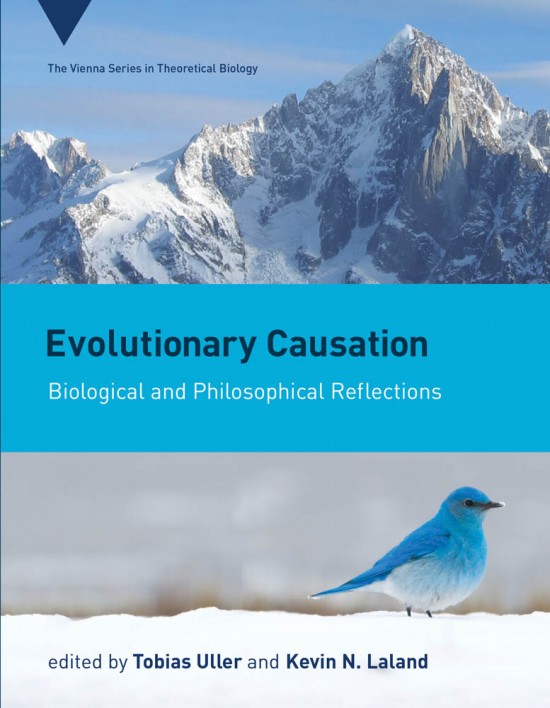“Evolutionary Causation” (2019): Interview with co-editor Tobias Uller
by Lynn Chiu
18 September 2019

It’s out! 15 chapters. 345 pages. “Evolutionary Causation: Biological and Philosophical Reflections“, edited by Tobias Uller and Kevin Laland, has just been released through the MIT Press. This is THE book of the EES project, a collection of tightly integrated essays written by biologists and philosophers to together investigate the causal structure of evolutionary processes.
There are so many ways to read this book. In the next few blog posts, we will rearrange the chapters around major themes such as developmental bias & plasticity, niche construction, major transitions in individuality, and the conceptual & historical aspects of evolutionary theory. Today, I am excited to talk to Tobias Uller, lead co-editor, about the book and its backstory.

Tobias unboxing the book
Lynn Chiu: Tobias, it is incredible to see high profile scientists and philosophers come together to discuss foundational issues in evolutionary biology. What unifies these chapters and why the title “evolutionary causation”?
Tobias Uller: The book is about how to think about the causes of evolution. This is important because to explain something is often to give an account of its causes. So we had better have a decent grasp of what we mean when we say that X is a cause of Y, or what makes some features causes and other features constraints. If we don’t, the risk is that we don’t manage to deliver the explanations we want, or that we end up in fruitless debates.
In evolutionary biology, fitness differences is commonly considered to be necessary and sufficient to explain adaptation, whereas the processes that generate variation – development – only explains the absence of adaptation. That seems to suggest there is something special about the causes of fitness differences, or natural selection. Alternatively, this apparent asymmetry in causal power may be a result of the way we represent evolution, and not something that is inherent to the fabric of evolution. After all, the classic distinction between proximate and ultimate causes that was popularized by Ernst Mayr is based on an idealization of biological evolution and not the full gory details. Perhaps it is not always the appropriate idealization? To complicate things further, some people think that natural selection does not really qualify as a cause at all. If this is true, then perhaps some of our evolutionary explanations are not even causal.
Some of this may sound philosophical to biologists like myself, but we could also think of it as theoretical biology. Understanding what counts as causes is really important to scientists since we routinely look for those causes and argue about their importance and explanatory power. Both biologists and philosophers of science have important insights to contribute here, so they are both given ample space. One thing that makes the book special is that the chapters are really highly accessible for scholars from both disciplines.
Lynn Chiu: I completely agree that philosophy of biology is part of biology! I would think of it as conceptual biology since theoretical biology is usually connected to mathematical modeling. Can you tell us how the book came to be? How did you bring philosophers and biologists together under this project?
Tobias Uller: The chapters are based on presentations at a meeting1 at the KLI in Austria in 2017. The KLI is an institute for theoretical biology and it is a wonderful place for meetings like these. Kevin Laland and I organized it as part of our EES research program on evolutionary biology. Twenty projects in this program are theoretical or empirical, but they were put together with the belief that we have much to gain from working closely with philosophers of biology. That is why there are also projects focused on philosophical foundations. I think this aspect of the project has made an enormous difference. It made the individual projects sharper, and it has played an important role in moving forward various controversies in evolutionary biology, in particular those that revolve around the causal and explanatory role of development, extra-genetic inheritance and niche construction. This book is one contribution towards that goal.
Lynn Chiu: So the inclusion of philosophy was there at the very beginning! That explains why these chapters have such enticing titles. I’ve included the full table of contents below.
Tobias Uller:I recommend beginning with the Introduction since this gives context and briefly summarizes what is in the other chapters. The book is organized in a way that should make it rewarding to read the chapters in order. We have chapters that deal with population genetics, evo-devo and more ecologically oriented perspectives. Many chapters are concerned one way or another with how evolutionary biologists handle the fact that what they wish to explain is enormously complex and has a history. Sometimes the evolutionary process itself is evolving, and we cover new thoughts on evolutionary transitions in individuality. We also have chapters on the relationship between causation and information in biology and fundamental problems in philosophy of science, such as the methodology of research programs.
Each chapter is stand-alone so which one you would want to read next depends on who you are!
Lynn Chiu: Thank you, Tobias, for the overview! I’m excited to read this book, though I’m a bit shy about my own chapter! Here’s what we’ll do as a next step. I will group the chapters under different EES related themes– niche construction, plasticity, major transitions in individuality, and conceptual issues. I recommend starting with the introduction and Massimo Pigliucci’s “Causality and the Role of Philosophy of Science,” which starts with the intriguing “Science and/vs. Philosophy of Science. This will be a treat for those of you interested in how philosophy can work together with science.
Table of Contents:
1. Evolutionary Causation
by Tobias Uller and Kevin N. Laland
2. Causality and the Role of Philosophy of Science
by Massimo Pigliucci
3. Understanding Bias in the Introduction of Variation as an Evolutionary Cause
by Arlin Stoltzfus
4. The Shape of Things to Come: Evo Devo Perspectives on Causes and Consequences in Evolution
by Armin P. Moczek
5. Incorporating the Environmentally Sensitive Phenotype into Evolutionary Thinking
by David I. Dayan, Melissa A. Graham, John A. Baker, and Susan A. Foster
6. Genotype-Environment Interaction and the Unscripted Reaction Norm
by Sonia E. Sultan
7. Understanding Niche Construction as an Evolutionary Process
by Kevin N. Laland, John Odling-Smee, and Marcus W. Feldman
8. Biological Dynamics and Evolutionary Causation
by Renée A. Duckworth
9. The Causes of a Major Transition: How Social Insects Traverse Darwinian Space
by Heikki Helanterä and Tobias Uller
10. Are Developmental Plasticity, Niche Construction, and Extended Inheritance Necessary for Evolution by Natural Selection? The Role of Active Phenotypes in the Minimal Criteria for Darwinian Individuality
by Richard A. Watson and Christoph Thies
11. The Paradox of Population Thinking: First-Order Causes and Higher-Order Effects
by Denis M. Walsh
12. Ontology, Causality, and Methodology of Evolutionary Research Programs
by Jun Otsuka
13. A Darwinian Dream: On Time, Levels, and Processes in Evolution
by Arnaud Pocheville
14. Decoupling, Commingling, and the Evolutionary Significance of Experiential Niche Construction
by Lynn Chiu
15. Biological Information in Developmental and Evolutionary Systems
by Karola Stotz
The MIT Press publication page: https://mitpress.mit.edu/books/evolutionary-causation
1. Information about the 1st EES workshop on cause and process in evolution
Twitter hashtag: #CAPIE2017
Blog posts on the 1st workshop by Wim Hordijk, Jan Baedke, and Massimo Pigliucci
KLI event webpage and photo gallery